Key Takeaways:
- Probiotics can significantly improve an infant's digestive health and immune system.
- Choosing the right probiotic strain is crucial for addressing specific health concerns in infants.
- Consulting with a pediatrician before starting any probiotic supplement is essential for your baby's health.
Introduction
When it comes to ensuring the health and well-being of your baby, every parent wants to make the best choices. One of the most talked-about supplements for infants today is the infant probiotic.
These beneficial bacteria can play a pivotal role in your baby’s digestive health and immune system. But with so many options available, how do you choose the best probiotic for infants? This guide will walk you through everything you need to know.
What Are Probiotics?
Probiotics are live microorganisms that offer health benefits when consumed in sufficient quantities. Commonly known as "good bacteria," they play a crucial role in maintaining a healthy balance within the gut microbiome.
For infants, probiotics can be especially advantageous, aiding in digestive health and enhancing the immune system.
Why Are Probiotics Important for Infants?
Infants are born with a sterile digestive tract, and the introduction of beneficial bacteria is crucial for their digestive system development.
Probiotics can help in establishing a healthy gut microbiome, which is essential for nutrient absorption, immune function, and overall health.
They can also help in reducing colic symptoms and preventing antibiotic-associated diarrhea. Additionally, probiotics are known to prevent antibiotic associated diarrhea by restoring the balance of good bacteria in the gut.
Types of Probiotic Strains
Different strains of probiotics offer various health benefits. Some of the most commonly used strains in infant probiotics include:
- Lactobacillus rhamnosus GG: Known for its ability to reduce colic symptoms and improve digestive health.
- Bifidobacterium species: These strains are particularly beneficial for breastfed babies as they help in digesting mom’s breast milk.
- Lactobacillus reuteri: This strain is effective in reducing crying time in colicky babies, as well as reducing symptoms of gas, spit-ups, occasional constipation, and diarrhea. Studies have shown its benefits in reducing instances of regurgitation in babies.
How to Choose the Best Probiotic for Infants
When selecting a probiotic for your baby, it's essential to consider the following factors:
- Quality and Safety: Look for products that are third-party tested and free from major allergens.
- Specific Strains: Choose probiotics that contain strains known to benefit infants, such as Lactobacillus rhamnosus GG and Bifidobacterium species.
- Formulation: Opt for baby probiotic drops or powders that can be easily mixed with infant formula or breast milk.
#1: BioGaia Baby Probiotic Drops
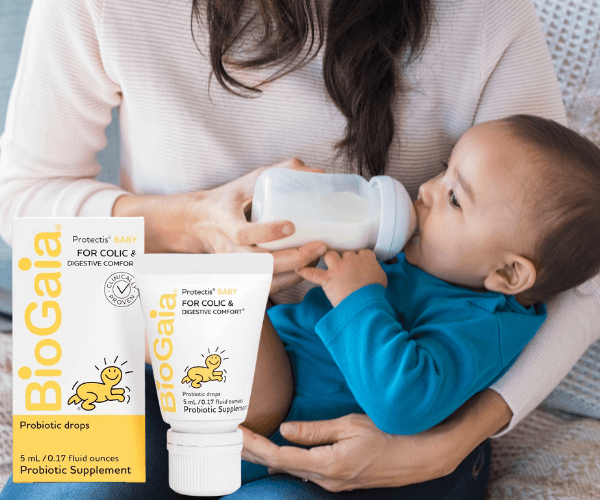
Read more
BioGaia Baby Probiotic Drops are designed to support your baby's digestive health and immune system with clinically proven probiotics.
These drops are easy to administer and help reduce colic, spit-ups, and occasional constipation.
Exclusive Insights:
· Clinically Proven: Contains Lactobacillus reuteri, a probiotic strain that has been extensively studied and shown to improve digestive health in infants.
· Easy to Use: Comes in a convenient dropper bottle, making it simple to add to your baby's food or directly into their mouth.
· Safe and Natural: Free from artificial colors, flavors, and preservatives, ensuring your baby gets only the best.
Pros:
- Effective in reducing colic and digestive discomfort.
- Easy to administer with a dropper.
- Safe for daily use.
Cons:
- Slightly more expensive than some other probiotic options.
- Needs to be refrigerated after opening.
Customer Review:
"As a new mom, I was desperate to find something to help my baby with her colic. BioGaia Baby Probiotic Drops were a game-changer! Within a week, I noticed a significant reduction in her fussiness and spit-ups.
The dropper makes it so easy to give, and I love that it's all-natural. Worth every penny!"
Benefits of Infant Probiotics
Probiotics offer a range of health benefits for infants, including:
- Improved Digestive Health: Probiotics play a vital role in maintaining a healthy balance of beneficial bacteria in the gut, which is essential for proper digestion.
- Enhanced Immune Support: A healthy gut microbiome can boost the immune system, reducing the risk of infections and autoimmune diseases.
- Reduced Colic Symptoms: Certain probiotic strains, such as Lactobacillus reuteri, have been shown to reduce crying time in colicky babies.
A systematic review found a significantly lower risk of diarrhea lasting more than three days when using probiotics compared to a placebo.
Probiotics for Colicky Babies
Colic is a common issue in infants, characterized by excessive crying and discomfort. Probiotics, particularly Lactobacillus reuteri, have been shown to reduce colic symptoms and improve overall gut health.
A systematic review of studies found that infants treated with this strain experienced a significant reduction in crying time compared to a control group.
Probiotics and Antibiotic-Associated Diarrhea
Antibiotics can disrupt the balance of good bacteria in the gut, leading to diarrhea. Probiotics can help in preventing antibiotic-associated diarrhea by restoring the healthy balance of bacteria in the digestive tract.
This is particularly important for preterm infants who are more susceptible to digestive upset.
#2: Mommy's Bliss Baby Probiotic Drops
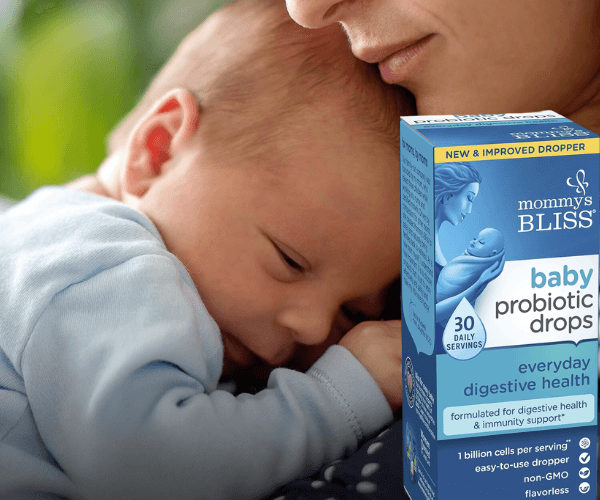
Read more
Mommy's Bliss Baby Probiotic Drops are formulated to support your baby's digestive and immune health with a blend of beneficial probiotics.
These drops are designed to ease colic, gas, and occasional diarrhea, promoting a happier and healthier baby.
Exclusive Insights:
· Dual-Strain Formula: Contains Lactobacillus rhamnosus GG and Bifidobacterium lactis, two powerful probiotic strains known for their digestive benefits.
· No Refrigeration Needed: Unlike many other probiotic drops, these can be stored at room temperature, making them convenient for travel.
· Allergen-Free: Free from dairy, gluten, and soy, ensuring they are safe for babies with sensitive tummies.
Pros:
· Effective in reducing colic, gas, and diarrhea.
· Convenient storage without refrigeration.
· Allergen-free formula.
Cons:
· The dropper can be a bit tricky to use.
· Some parents may find it slightly pricey.
Customer Review:
"Mommy's Bliss Baby Probiotic Drops have been a lifesaver for our family! Our little one struggled with gas and colic, and these drops made a noticeable difference within days.
I love that they don't need refrigeration, which is perfect for our on-the-go lifestyle. Plus, knowing they're allergen-free gives me peace of mind. Highly recommend!"
Probiotics and Immune System
A healthy gut microbiome is essential for a robust immune system. Probiotics can enhance immune function by promoting the growth of beneficial bacteria and inhibiting the growth of harmful pathogens. This can reduce the risk of infections and autoimmune diseases in infants.
Probiotics and Digestive System Development
The digestive system of infants is still developing, and probiotics can play a crucial role in this process.
They help in breaking down food, absorbing nutrients, and maintaining a healthy balance of bacteria in the gut.
This is particularly important for breastfed babies, as probiotics can help in digesting mom’s breast milk more efficiently and support the baby's overall health by minimizing the growth of harmful bacteria.
Probiotics and Preterm Infants
Preterm infants are at a higher risk of developing digestive issues and infections. Probiotics can help in reducing these risks by promoting a healthy gut microbiome.
Studies have shown that certain probiotic strains can reduce the incidence of necrotizing enterocolitis, a severe intestinal condition in preterm infants.
#3: Lovebug Award Winning Probiotics
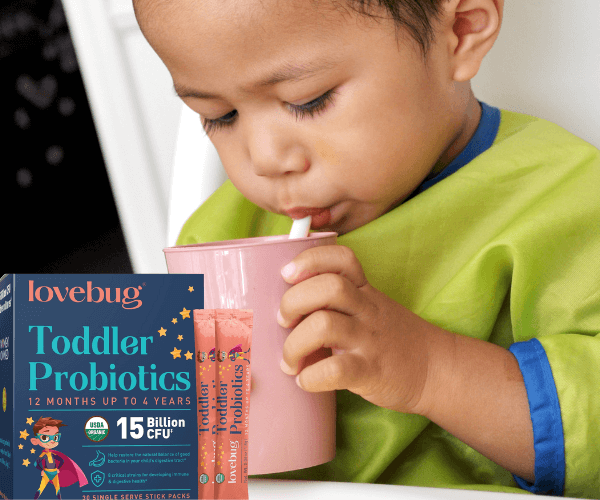
Read more
Lovebug Toddler Probiotics are specially formulated to support your toddler's digestive health and immune system with a blend of beneficial probiotics.
They contain specific probiotic strains that are beneficial for infants, such as Lactobacillus rhamnosus GG and Bifidobacterium species. These probiotics are also third-party tested and free from major allergens.
These chewable tablets are easy for little ones to take and help maintain a healthy gut flora.
Exclusive Insights:
· Toddler-Friendly Formula: Contains a blend of 5 different probiotic strains tailored to meet the needs of toddlers.
· Chewable Convenience: Comes in a delicious chewable form that toddlers love, making it easy to incorporate into their daily routine.
· Immune Support: Helps bolster your toddler's immune system, reducing the frequency of common illnesses.
Pros:
· Specifically designed for toddlers.
· Easy-to-take chewable tablets.
· Supports both digestive and immune health.
Cons:
· Some toddlers may be picky about the flavor.
· Requires daily administration for optimal benefits.
Customer Review:
"My picky eater absolutely loves Lovebug Toddler Probiotics! The chewable tablets are a hit, and I've noticed a significant improvement in her digestion and overall health.
It's such a relief to find a product that works and that she enjoys taking every day. Highly recommend for any parent looking to boost their toddler's health!"
Probiotics and Infant Formula
For parents who use infant formula, choosing a formula that contains probiotics can provide additional health benefits for their baby.
Many infant formulas are now fortified with specific probiotic strains to support digestive health and immune function.
Probiotics and Breastfed Babies
Breastfed babies can also benefit from probiotics. Certain strains, such as Bifidobacterium species, are particularly beneficial for breastfed infants as they help in digesting mom's breast milk and promoting a healthy gut microbiome.
Probiotics and Colic Symptoms
Colic can be a distressing condition for both babies and parents. Probiotics, particularly Lactobacillus reuteri, have been shown to reduce colic symptoms by improving gut health and reducing inflammation. This can lead to a happier baby and less stress for parents.
Probiotics and Painful Gas
Painful gas is a common issue in infants, often leading to discomfort and crying.
Probiotics can help in reducing gas by promoting a healthy balance of bacteria in the gut and improving digestion. This can lead to a more comfortable and happy baby.
#4: Culturelle Baby Immune & Digestive Support Probiotic + Vitamin D Drops
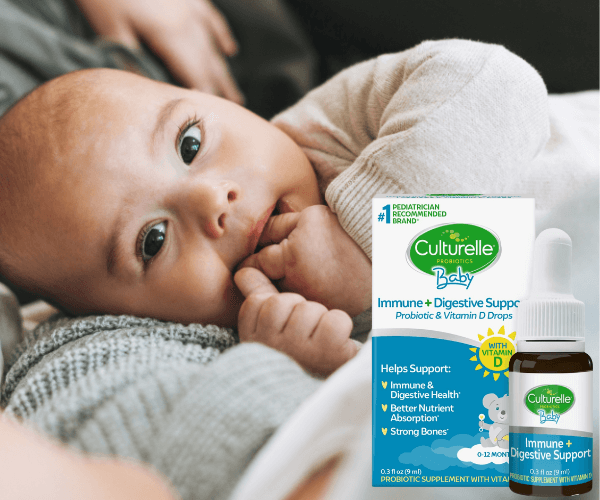
Read more
Culturelle Baby Immune & Digestive Support Probiotic + Vitamin D Drops are designed to support your baby's developing immune and digestive systems with a blend of probiotics and essential Vitamin D.
These drops are easy to administer and help ensure your little one gets the nutrients they need for a healthy start.
Exclusive Insights:
· Probiotic Power: Contains Lactobacillus rhamnosus GG, a clinically proven probiotic strain that supports digestive health.
· Vitamin D Boost: Provides 400 IU of Vitamin D to aid in the development of strong bones and teeth.
· Easy to Use: Comes in a convenient dropper bottle, making it simple to add to your baby's food or directly into their mouth.
Pros:
· Supports both immune and digestive health.
· Easy to administer with a dropper.
· Contains essential Vitamin D for bone health.
Cons:
· Some babies may not like the taste.
· Requires consistent daily use for best results.
Customer Review:
"As a new mom, I was worried about my baby's digestion and immune system. Culturelle Baby Immune & Digestive Support Probiotic + Vitamin D Drops have been a lifesaver!
My little one is happier and healthier, and I love how easy it is to give these drops. Highly recommend to all parents!"
Probiotics and Healthy Digestion
Healthy digestion is crucial for an infant's overall health and well-being. Probiotics can help in maintaining a healthy balance of good bacteria in the gut, which is essential for breaking down food, absorbing nutrients, and preventing digestive issues.
Probiotics and Immune Support
A healthy gut microbiome is essential for a robust immune system. Probiotics can enhance immune support by promoting the growth of beneficial bacteria and inhibiting the growth of harmful pathogens. This can reduce the risk of infections and autoimmune diseases in infants.
Probiotics and Healthy Balance
Maintaining a healthy balance of good bacteria in the gut is crucial for an infant's overall health.
Probiotics contribute to maintaining this balance by fostering the growth of beneficial bacteria and suppressing harmful pathogens.
Probiotics and Vitamin D
Vitamin D is essential for an infant's bone health and immune function. Some probiotic supplements are fortified with vitamin D to provide additional health benefits.
This can be particularly beneficial for infants who may not get enough vitamin D from their diet.
#5: MaryRuth's Infant Liquid Probiotic Drops
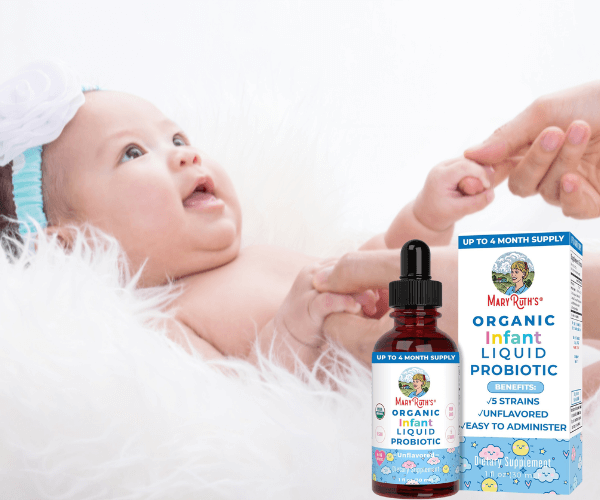
Read more
MaryRuth's Infant Liquid Probiotic Drops are specially formulated to support your baby's digestive and immune health from the very beginning.
These easy-to-administer drops are made with organic ingredients and are free from common allergens.
Exclusive Insights:
· Organic and Allergen-Free: Made with organic ingredients and free from dairy, gluten, soy, and other common allergens.
· Easy Administration: Comes with a dropper for precise and hassle-free dosing, perfect for infants.
· Supports Gut Health: Contains beneficial probiotics that promote a healthy digestive system and boost immunity.
Pros:
· Safe for infants with sensitive stomachs and allergies.
· Simple to administer with the included dropper.
· Promotes both digestive and immune health.
Cons:
· Needs to be refrigerated after opening.
· Some parents may find the price higher compared to other probiotic options.
Customer Review:
"As a new mom, I was looking for a probiotic that would be gentle on my baby's tummy, and MaryRuth's Infant Liquid Probiotic Drops have been a lifesaver!
The dropper makes it so easy to give, and I've noticed a significant improvement in my baby's digestion and overall mood.
Plus, knowing it's organic and allergen-free gives me great peace of mind. I can't recommend this product enough to other parents!"
Probiotics and Major Allergens
When choosing a probiotic supplement for your baby, it's important to look for products that are free from major allergens such as dairy, soy, and gluten.
This can help in reducing the risk of allergic reactions and ensuring the safety of the supplement.
Probiotics and Third-Party Testing
Quality and safety are crucial when it comes to choosing a probiotic supplement for your baby. Look for products that are third-party tested to ensure they meet high standards of quality and safety.
Probiotics and Eco Excellence Award
The Eco Excellence Award recognizes products that are environmentally friendly and safe for babies.
Some probiotic supplements have received this award, indicating their commitment to quality and sustainability.
Probiotics and Happy Baby
A happy baby is a healthy baby. Probiotics can help in promoting overall health and well-being by improving digestive health, boosting the immune system, and reducing colic symptoms. This can lead to a happier and more comfortable baby.
#6: Wellements Organic Baby Probiotic Drops
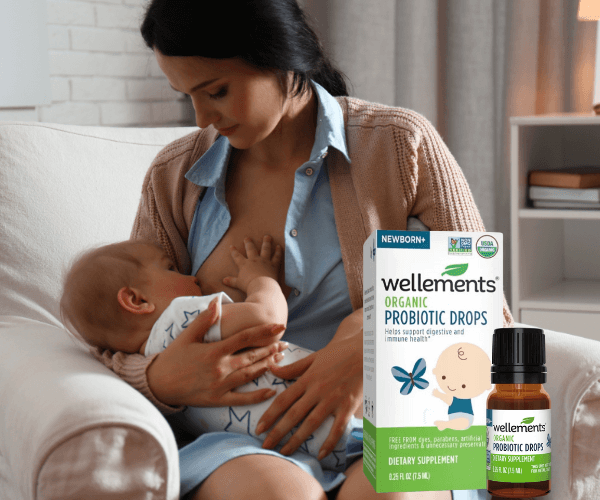
Read more
Wellements Organic Baby Probiotic Drops are designed to support your baby's digestive and immune health with a gentle, organic formula.
These drops are easy to use and free from preservatives, making them a safe choice for your little one.
Exclusive Insights:
· Certified Organic: Made with organic ingredients, ensuring no harmful chemicals or preservatives.
· No Refrigeration Needed: Conveniently shelf-stable, making it easy to use at home or on the go.
· Promotes Digestive Health: Contains a blend of beneficial probiotics to help maintain a healthy gut flora.
Pros:
· Certified organic and free from preservatives.
· Shelf-stable, no need for refrigeration.
· Supports both digestive and immune health.
Cons:
· The dropper can sometimes be tricky to use.
· Some parents may find the taste slightly off-putting for their baby.
Customer Review:
"I've been using Wellements Organic Baby Probiotic Drops for my 6-month-old, and the results have been fantastic!
The fact that it's organic and doesn't need refrigeration makes it super convenient for our busy lifestyle.
My baby seems happier and less fussy, and I love knowing I'm giving her something natural and safe. Highly recommend to all parents looking for a reliable probiotic!"
Probiotics and Pediatric Gastroenterology
Pediatric gastroenterologists often recommend probiotics for infants with digestive issues.
Probiotics can help in maintaining a healthy balance of good bacteria in the gut, which is essential for healthy digestion and overall health.
Probiotics and Systematic Review
A systematic review of studies on probiotics for infants has shown that they can provide a range of health benefits, including improved digestive health, enhanced immune support, and reduced colic symptoms.
This highlights the importance of choosing the right probiotic supplement for your baby.
Probiotics and Control Group
Studies on probiotics for infants often include a control group to compare the effects of the probiotic supplement.
These studies have shown that infants who receive probiotics experience significant improvements in digestive health and overall well-being compared to those in the control group.
Probiotics and Live Microorganisms
Probiotics are live microorganisms that offer health benefits when consumed in sufficient quantities.
They help in maintaining a healthy balance of good bacteria in the gut, which is essential for healthy digestion and immune function.
Probiotics and Adverse Events
While probiotics are generally safe for infants, it's important to monitor for any adverse events.
Some infants may experience mild digestive upset when starting a probiotic supplement. If you notice any adverse reactions, consult with your pediatrician.
Final Thoughts
Probiotics can offer a range of health benefits for infants, including improved digestive health, enhanced immune support, and reduced colic symptoms.
When choosing a probiotic supplement for your baby, it's important to consider factors such as quality, specific strains, and formulation.
Always consult with your pediatrician before starting any new supplement to ensure it's safe and appropriate for your baby's needs.
FAQ's
What is the best probiotic for infants?
The best probiotic for infants depends on your baby’s specific needs. Some of the most commonly recommended strains include Lactobacillus rhamnosus GG, Bifidobacterium species, and L. reuteri.
L. reuteri is particularly noted for its benefits in reducing symptoms of colic, gas, spit-ups, and occasional constipation and diarrhea. Always consult with your pediatrician to determine the best option for your baby.
Can probiotics help with colic in babies?
Yes, certain probiotic strains, such as Lactobacillus reuteri, have been shown to reduce colic symptoms in infants.
These probiotics can improve gut health and reduce inflammation, leading to a reduction in crying time.
Are probiotics safe for infants?
Probiotics are generally safe for infants, but it’s important to choose high-quality products that are third-party tested and free from major allergens.
Always consult with your pediatrician before starting any new supplement to ensure it’s safe and appropriate for your baby’s needs.
How do I administer probiotics to my baby?
Probiotics can be administered to infants in several ways, including baby probiotic drops, powdered probiotics mixed with breast milk or formula, and probiotic-enhanced foods.
Baby probiotic drops are often the easiest to administer, as they can be added to your baby's bottle or given directly into their mouth.
When can I start my newborn on probiotics?
It's best to consult your pediatrician before starting your newborn on probiotics, as they can offer tailored advice based on your baby's specific health needs.
Generally, some healthcare providers may recommend probiotics for infants as early as a few weeks old, but professional guidance is crucial.
Looking for the best products? We've got you covered! Our editors have handpicked each item on this list. EisonReports may receive a share of sales or compensation if you choose to make a purchase through the provided links. Reviews have been edited for brevity and clarity. Enjoy discovering products to enhance your life!








